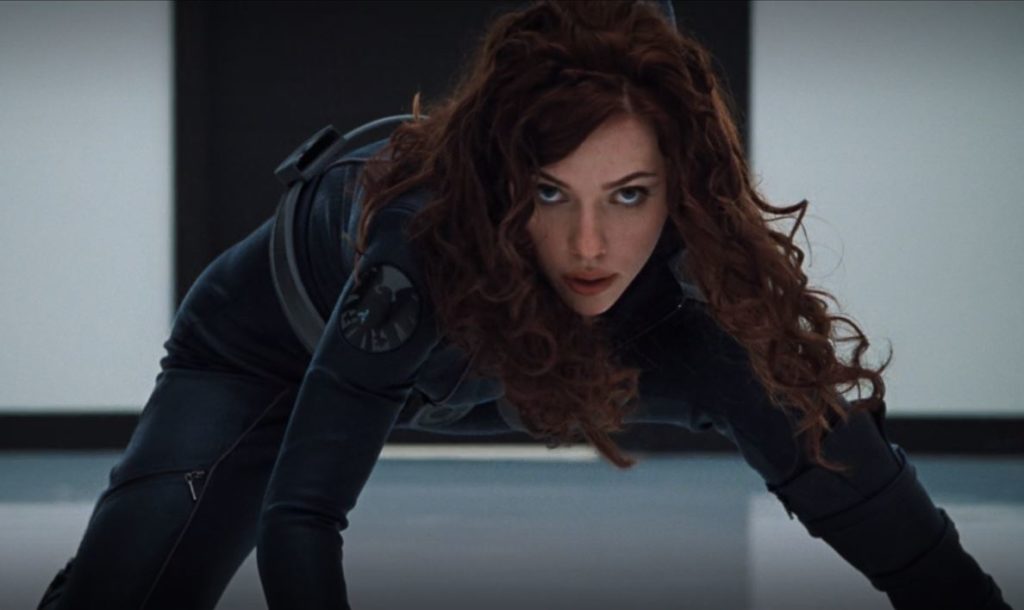Hollywood is mired in a new trend: heavy-handed feminism at the expense of the lead heroine. It’s bizarre. Black Widow joins an ever-growing list of top-tier heroines demoted through poor writing and scene-stealing tagalong characters. From Sarah Connor (Terminator: Dark Fate) to Wonder Woman (Wonder Woman 1984) to Rey (The Last Jedi & The Rise of Skywalker) to Mulan (Mulan 2020) to the numerous heroines in Game of Thrones, writers and filmmakers are flat out ruining heroines.
Despite being a secondary character in the Avengers saga, ScarJo always commanded an incredible on-screen presence. She’d stride through scenes with snappy quips, and a cool, casual confidence backed up by lethal fighting efficiency. Not even Captain America or Tony Stark upstaged Black Widow when they shared scenes. But in her standalone film, every other character tries to be the center of attention, yet none of them are more interesting than Natasha Romanov. She’s quiet and stays in the background. I think Scarlet Johansson has the fewest speaking lines in the whole movie. Most of the screen time and one-liners go instead to Florence Pugh, who plays Black Widow’s sister, Yelena. The movie’s cynical and dreary tone suits Yelena, who makes fun of Black Widow’s superhero poses and celebrity status as an Avenger.

Remember the Black Widow trailer we saw two years ago? Remember the scenes of practicing young ballerinas spliced with women training with handguns? I couldn’t wait to see the movie! Marvel seemed poised to deliver a Cold War origin story set in the Soviet Union where we’d see how Natasha Romanov became an international Avengers-level assassin. (Minor spoilers ahead) But nah! The opening sequence opened instead with a bland glimpse at Natasha’s preteen life in 1995 suburban Ohio. But her flashback actually serves as the back story for her Communist father more so than Natasha Romanov.
Why?
The film also leads off in a much less exciting post-Cold War Bill Clinton-era America. How does that complement a Black Widow origin story? And in the heyday of compact discs, the characters listen to a 1980’s cassette tape of a 1971 song, which totally distorts the 90’s era they’re trying to establish. Why? The tone is all over the place. The movie even misses minor opportunities. In 1995, little Natasha had blue hair dye. I don’t remember blue dye being a thing in 1995 but even so—since we’re dealing with the Black Widow’s origin story, why not show the future Black Widow with red hair dye?
And that was just the opening flashback.

Oddly, I never felt much of a connection to the big Avengers films while watching Black Widow. The characters make references to the Avengers, but the Marvel brand of optimism and fun just wasn’t here. I actually started shifting in my seat from boredom during the later action sequences, ready to get home and hang out with my wife.
The primary villain of Black Widow, someone named Dreykov, is an old man with no superpowers. He’s the most unthreatening, most boring villain ever to grace the MCU. But even worse, the movie wastes time setting up another “villain,” who strides into the film wearing a skull helmet. The name of this menacing supervillain? No idea. The movie never bothers to give “skull helmet” a supervillain name. When we get to the final battle, Black Widow just uses red magic mist to turn “skull helmet” to the good side. It was all a mistake. Folks, this is lazy writing that skips character growth and human change through storytelling and characterization.
The fog of Marvel’s decade-long success will hide Black Widow’s flaws for a while. Yes, Black Widow will score big at the box office, and yes, the corporate press will praise the movie as “amazing,” but I promise, Black Widow will not stand the test of time. The 24th film in the MCU is a clear step-down. I can’t imagine rewatching this film, and I can’t help but feel like yet another opportunity for a great heroine has been squandered.
